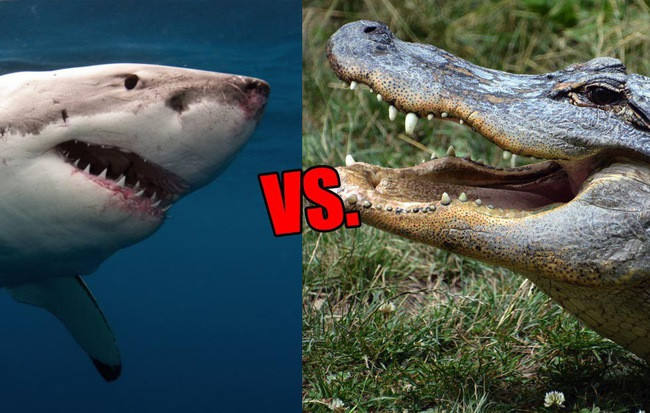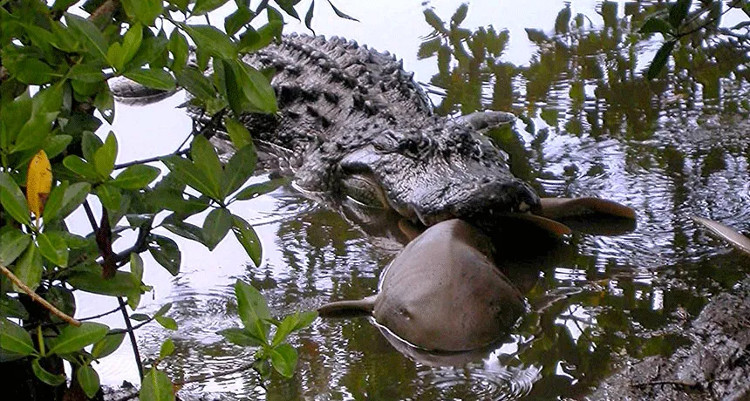Crocodile vs shark: what do you think will win?
Crocodile does not only exist in freshwater environment. This reptile can occasionally appear in salty waters (for a short period of time), and even willing to fight sharks.
You know, crocodiles don't just live in the Amazon, Nile or famous rivers in the world. Occasionally, they can explore the sea again, in order to find more diverse sources of food.
Because of that behavior, James Nifong, an expert at the University of Kansas Wildlife Research Unit in Manhattan, spent years documenting the hunting habits of the crocodile in the area. sea.

Crocodile and shark, which one will win?
Nifong's most recent discovery surprised many people. He discovered that the short American crocodile (Alligator Mississippiensis) can actually become a god when it comes to the sea. In their menu there are at least 3 sharks and 2 rays.
Russell Lowers biologist, working at the Kennedy Space Center in Cape Canaveral, Florida, once took a picture of a female crocodile holding an Atlantic rays. Lower and Nifong then continue to gather more evidence.
One of them is a crocodile eating a mouth shark hinged in 2003. Three years later another person captured a crocodile eating a small hammer shark.

A picture of a crocodile eating a Nurse Shark at Sabinel Island, Florida in August 2003. The picture shows that sharks can also be good prey for large reptiles. this.
All of the above evidence shows that in order to hunt these prey, alligators have to swim into the saltwater area. However, crocodiles have no body to filter salt from seawater, so they will be under great pressure due to dehydration and increased salt content in the blood.
Excessive salt content can cause alligators to die. So to cope with this, crocodiles often swim back and forth between saline and freshwater areas. And to prevent seawater from entering the body, they close the nostrils and throat with a specially formed membrane.
When eating, crocodiles float on the surface of the water so that salt water escapes from the mouth first, then they swallow the food. When thirsty, they do the same to drink rainwater.
With Nifong, when he catches a crocodile, he will try blood and urine samples, then use a pipe to crocodile mouth, causing them to vomit what they eat without hurting them. After that, he will release these crocodiles to nature.

The process of sampling fluids of crocodiles.
As a result, they found that alligators have a rich diet that includes small fish, mammals, birds, insects and crustaceans, even fruits and nuts. However, in the study, no traces of sharks and rays were found.
To explain, Lowers thinks it's because the crocodile's stomach is extremely quick to digest, while sharks are not "easy". If they eat a shark from a few days ago, it can't find anything when they catch it.
The dual hunting between the crocodile's two water environments takes place throughout the southeastern United States estuary and they affect the ecosystem here.
For example, one of the prey of alligators is sea crab. When crocodiles appear in saltwater areas, they will limit the hunting of sea crabs to snails. Because they are not threatened by crabs, these snails will comfortably eat plants that make up the ecosystem here and lose their balance.
Understanding the hunting habits of crocodiles is very important to develop measures to preserve the estuarine ecosystem.
- Crocodile bite dead sharks
- Crocodiles attack and eat sharks that make experts amazing
- Crocodile is more dangerous than a shark 168 times
- Crocodile heads a hammer death series on the coast of Fiji
- Big sharks eat small sharks
- Video: 4m long crocodile devoured its kind
- Video: Crocodile expert holds a giant crocodile stick and the end
- The first shark in history to know ... vegetarian but still healthy
- Video: Crocodile all jump straight up
- 6m long crocodile fish bait in Australia
- Crocodile-eating alligator on American lake
- Catch the 2.8m long crocodile that once swallowed a man
 Animal 'suffering' after hibernation
Animal 'suffering' after hibernation Why do goats climb well?
Why do goats climb well? Scientists were surprised to see chimpanzees eating turtles
Scientists were surprised to see chimpanzees eating turtles Giant catfish died deadly due to drought in Thailand
Giant catfish died deadly due to drought in Thailand